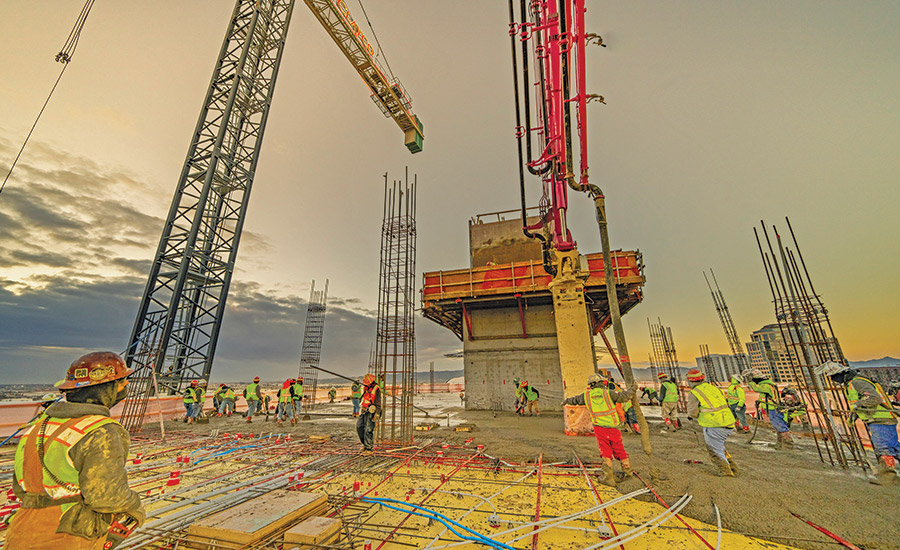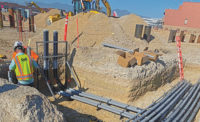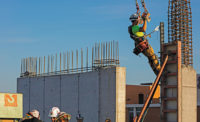Related Link:
ENR Southwest Top Contractors 2023
A familiar scenario is playing out as firms participating in ENR Southwest’s annual Top Contractors survey for Arizona, Nevada and New Mexico are reporting strong performance and backlogs, while at the same time, noting that qualified labor remains a top issue as well as materials availability and prices.
In northern Nevada, for instance, Craig Madole, CEO of the Nevada Chapter AGC, says, “We are seeing significant investment in highway projects, such as the US 395 widening by the Nevada Dept. of Transportation, continued expansion of the Tahoe-Reno Industrial Center, including Switch, Redwood Materials, Google, and Tesla, and countless warehouse and commercial buildings.”
The education market is surging, too, with the University of Nevada Reno UNR expanding its School of Business and the Washoe County School District investing more than $700 million over the next five years in new schools and renovations and the Reno-Tahoe Airport is about to begin a $500-million renovation.
As a result, workforce is the largest concern, Madole says. “Finding employees with the required skills is impacting all contractors.”

This chart shows the total revenue posted by the ranking’s top 25 firms compared with the total for all firms combined.
Noting that construction’s unemployment rate remains at a nearly all-time low, Kevin Burke, CEO for Burke Construction Group, says, “As an industry, we will need to continue to innovate and find new ways to attract talent to help propel our industry forward.” The contractor posted $239 million in Southwest revenue for 2022, up from its previous year’s total of $156.8 million.
Shad James, president and CEO at employee-owned Jaynes Corp. in Albuquerque, notes, “We are seeing the same industry challenges that everyone is likely experiencing. There are still some supply chain challenges, but the biggest issue is workforce and resource availability.” The company generated $225.53 million in regional revenue for 2022, slightly down from the 2021 total of approximately $235 million.
Andrew Geier, executive vice president for Layton Construction in Phoenix, reports that for the first half of 2023, he’s seen some costs begin to moderate and materials shortages diminish slightly, with electrical gear and mechanical equipment still “sticky.” Layton totaled $869 million in Southwest revenue for 2022, roughly steady from the year prior.
Gretchen Kinsella, Arizona business unit leader for DPR, adds, “There are a lot of pressures on the industry right now, but the one that has the longest tail and is truly an existential issue for our industry continues to be the shortage of skilled labor. We can plan around supply chain pressures, interest rates and more, but we cannot make a million new skilled workers appear as quickly as we’d like or need.” The company’s Phoenix and Tucson offices generated $1.02 billion in 2022, earning it the top spot on this year’s Southwest Top Contractors ranking.
Improving the labor availability issue requires a “different mindset,” she says. DPR, for example, is recruiting differently and has started an apprenticeship program in open shop markets and also working with union partners to support their efforts.

The average firm revenue total in the Southwest rose to $263 million in 2022 after two years of declines.
Robust Markets Ahead
Health care continues to be a strong niche in the region. In 2022, for example, DPR completed the $242-million Mayo Clinic West Expansion in Phoenix and the $106-million Banner Desert Medical Center Women’s Tower Expansion in Mesa, Ariz. Currently, DPR is delivering the $134.6-million Mayo Clinic Integrated Education and Research Building.
Adding to Jaynes Corp.’s 2022 Southwest revenue, for example, was its $140-milliion Presbyterian Hospital Tower project in Albuquerque and the start of its $55-million project for Christus St. Vincent – Cancer Care Center in Santa Fe, N.M.
Layton’s Geier notes the contractor’s strong activity in industrial space, particularly in the booming Arizona market. In Glendale, west of Phoenix, the Commerce 303 - Building A is a roughly 662,000-sq-ft first phase of a two-phased industrial building complex, including a Class A building. And in nearby Litchfield Park, the massive 1.16-millon Sarival Logistics Center is a Class A cross-dock speculative industrial building.
Also of note is Layton’s construction of two high-rise towers in downtown Phoenix, both heading toward 2025 completion dates. Those include the roughly 1-million-sq-ft Central Station Redevelopment of the Central Transit station, a 32-story mixed-use project with 362 apartments, 70,000 sq ft of office space and a 21-story student housing tower. Meanwhile, the contractor’s 601 N Central project, at 1.35 million sq ft, is a 29-story tower containing 747 residential units, eight levels of above-grade parking and first-level retail.
“As an industry, we will need to continue to innovate and find new ways to attract talent.”
—Kevin Burke, CEO, Burke Construction Group
AGC’s Madole expects the construction economy will stay strong, with federal COVID relief funds still being invested by local governments. Gaming properties continue to make significant investments, such as the J Resort, which just broke ground on a new Reno tower, and commercial development continues robust. “Combined with the investments at the Tahoe-Reno Industrial Center and the work from NDOT and education, we anticipate good backlog for contractors into 2024–25,” he says.
James notes that “the market continues to be relatively busy. We have seen some slippage in job starts which led to lower top-line revenue for 2022, but Jaynes is confident in the outlook for 2023 and beyond,” he says. We are cautiously optimistic about the next one to three years.”
At Layton, 2023 appears to be a record-setting year, with significant Arizona and Nevada backlogs. Geier says that “the backlog is diverse and spans the industrial, health care, mission critical, office, hospitality, high-rise multifamily and tenant improvement market sectors.”
He’s also “cautiously optimistic,” adding that “headwinds created by higher interest rates and the stress in capital markets are concerning, but the Southwest is an attractive place to live, develop and invest.”
Kevin Burke, Burke’s CEO, adds the firm is focused on “improving the environmental impact of all our operations, reducing our carbon footprint, protecting the health, well-being and safety of our team members and building client visions with transparent and ethical practices. The industry as a whole has demonstrated commitment to building safer, healthier and more inclusive communities for all.”





Post a comment to this article
Report Abusive Comment